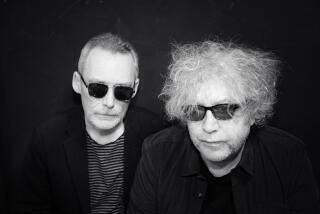They Got All They Bargained For
- Share via
The young members of the trio Black Rebel Motorcycle Club (a.k.a. B.R.M.C.) haven’t even released their first album yet, but their epic, droning, psychedelic music has already been hailed by such postmodern icons as Jesus and Mary Chain guitarist Jim Reid, Oasis’ Noel Gallagher and former Smiths guitarist Johnny Marr. Pretty cool, huh?
Well, uh . . . maybe not. Or, yeah, OK, sorta. Judging by the awkward silence around the conference table at their record label, Virgin Records, their feelings about that aren’t too clear.
Finally, almost impatiently, British-born drummer Nick Jago, 23, the group’s extrovert, pipes up, “I’m not gonna pretend it’s not exciting. It’s like, wow!” Then bandmates Robert Turner, 22, and Peter Hayes, 23, laugh. “They’re bands that we respect and like,” Turner adds. “It’s a great compliment coming from those people.”
These guys may be a little hesitant, if not deliberately vague, in interviews, but their debut collection, “Black Rebel Motorcycle Club,” due April 3, is a focused, accomplished work. Written and produced by the band, this thoroughly modern rock album picks up the dark threads woven into pop by such groups as the Velvet Underground and the Stooges.
And early supporters often invoked Jesus and Mary Chain when describing B.R.M.C., which made a name for itself on the L.A. club circuit in 1999 while living in San Francisco. A buzz quickly developed around its performances at such nightspots as the Troubadour and the Silverlake Lounge, during which Turner and Hayes traded off playing bass and guitar as easily as they switched vocal lines.
Thanks to that exposure, these young men were propelled almost overnight from the indie world of self-development into the high-powered universe of a major label after signing with Virgin in 1999.
B.R.M.C. joins a handful of groups, such as the Dandy Warhols, who have found niches at big record companies despite the common wisdom that majors aren’t willing to gamble on new or different sounds, let alone develop young acts, unless they are of the dancing, singing, pretty-face variety.
Virgin, perhaps encouraged by the critical success of such British holdings as Gomez, not only took the plunge, but also allowed the trio a surprising amount of control over its music.
“I was attracted to their integrity, to their utter refusal to acquiesce,” says Virgin Executive Vice President of A&R; Tony Berg, who signed B.R.M.C. “It would be hypocritical of me to sign such an independently minded band, only to ask them conform to a major-label mentality . . . whatever that is.”
He says Virgin expects to benefit simply by nurturing that stance. “I personally believe that B.R.M.C.’s ferociously uncompromised point of view is going to resonate with a large audience of intelligent, introspective kids who feel estranged or disenfranchised.”
When the band moved to L.A. in the fall of 1999, the players weren’t actively seeking a major-label deal. They just wanted to attract the attention of someone, anyone, who would pay for a follow-up to the 13-song demo they spent all their money making.
“The plan was to release [a] record, rather than just giving it to friends,” says Turner, who had played with high school pal Hayes for about four years before they hooked up with Jago in late 1998. In the beginning, they were called the Elements, but they discovered that a lot of bands had that moniker. So they took a new name from one of their early song titles, “B.R.M.C.,” which was inspired by the Black Rebels Motorcycle Club, Marlon Brando’s biker gang in the archetypal 1954 flick “The Wild One.”
Their scheme to find a richer-than-them benefactor succeeded beyond their wildest dreams. They were approached by labels both large and small before going with Virgin, yet even now they seem scarcely convinced of what is happening.
To Jago, the situation became more real in January, when B.R.M.C. (which will open for the Waterboys at the Roxy April 4 and 5) performed as part of the Sundance Film Festival’s four-day concert series, “Sounds for Visual Thinkers,” alongside such bands as Radiohead and Semisonic.
“At Sundance, something finally clicked,” he says. “I’m always a doubting Thomas. As it is right now, I still can’t believe we’re signed. But I came out of that show with more belief in the band.”
At first, however, they weren’t totally confident about signing on the major-label dotted line. “It was intimidating,” admits Hayes. “You’re never quite sure what’s going to happen. But the more people we met with, the clearer it became what we wanted out of [a record deal].”
Their cautious deliberations were supported by Turner’s dad, a longtime musician who became the group’s most trusted advisor. “Every time we were up against a question we weren’t quite sure how to go on, we’d ask him,” says Turner. “Doing that kept us away from some disasters.”
Telling various record company suitors exactly what they wanted also showed the members who was serious about doing things their way, however quirky that was. Besides giving them creative control over their music, for example, Virgin is releasing not one, but four double 7-inch vinyl singles decorated with paintings by Jago, who attended art school in England.
Still, their self-constructed path was hardly smooth. “It took a lot of time, and there were a lot of mistakes made,” Hayes says. “It was a learning curve, but [Virgin] stuck with us. They didn’t just take [the album] out of our hands and go, ‘You guys are totally [messing] up.’ Which was pretty amazing.”
Smiling, Turner adds, “Getting it right was like, the only way we could redeem ourselves.”
More to Read
The biggest entertainment stories
Get our big stories about Hollywood, film, television, music, arts, culture and more right in your inbox as soon as they publish.
You may occasionally receive promotional content from the Los Angeles Times.










